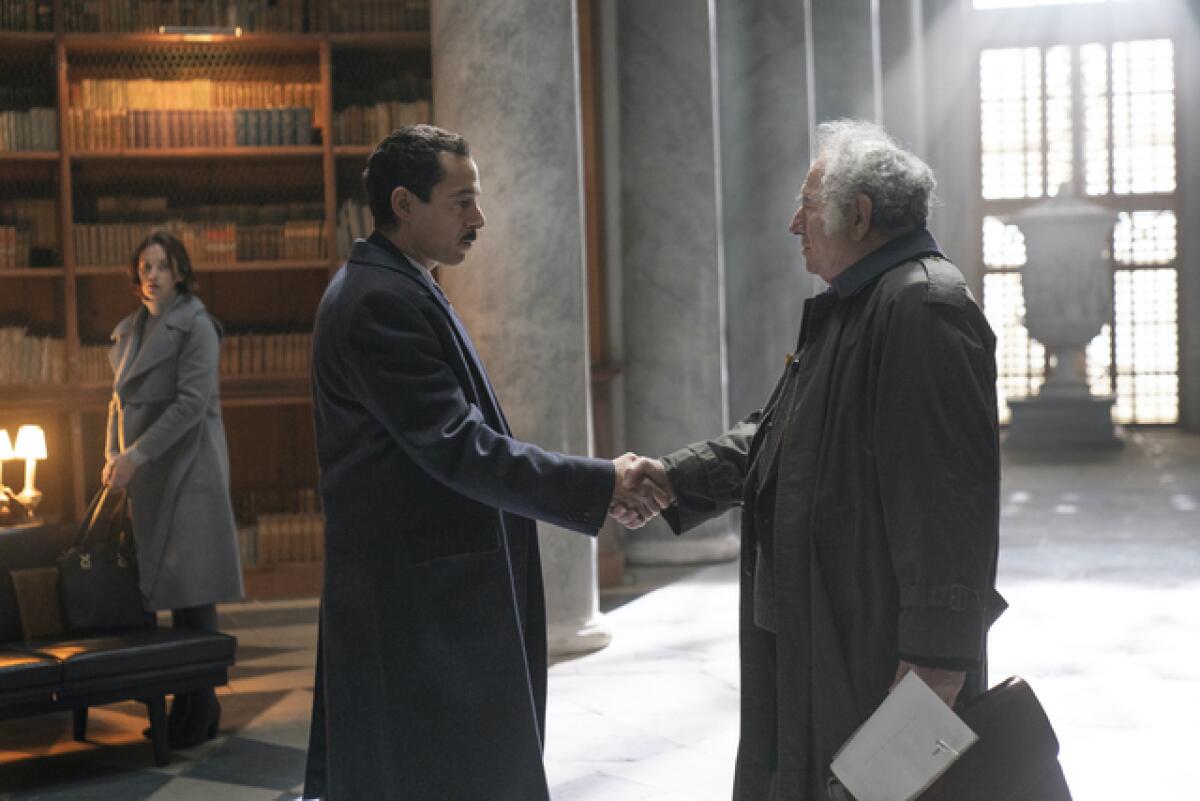HBO’s newest vision of Mideast peace shows how film and TV misunderstand the crisis

HBO’s new drama “Oslo” goes behind the scenes of the 1993 Oslo Peace Accords, a landmark moment that marked the first face-to-face agreement between the government of Israel and the Palestine Liberation Organization (PLO) and an unprecedented move toward peace.
Premiering Saturday, the drama chronicles the extraordinary efforts of Norwegians Mona Juul (Ruth Wilson), a Ministry of Foreign Affairs diplomat, and her spouse, Terje Rød-Larsen (Andrew Scott), a sociologist and director of the Fafo Foundation think tank, who together organized clandestine meetings between the warring parties in Oslo as an alternative to U.S.-led negotiations that had stalled. It resulted in not only the accord, but also the now-famous symbolic gesture of hope: a handshake between PLO Chairman Yasser Arafat and Israeli Prime Minister Yitzhak Rabin in front of President Clinton on the White House lawn. The final moments of the 118-minute film feature that image, as if to say: Look what’s possible.
Fast forward to the here and now, where what we’ve seen of Israel, Gaza and the Palestinian territories since the events depicted in the film is dispossession, apartheid, violence and, recently, another brutal military campaign. At least 248 people, including 66 children, were killed after an intense assault on Gaza by Israeli forces. In Israel, at least 12 people were killed, including two children, by Hamas rocket fire.
As Trump attacks Jewish Democrats and Muslim congresswomen, HBO’s “Our Boys,” set amid the Israeli/Palestinian conflict, walks a political tightrope.
Needless to say, the Peace Accords, like every other effort to quell tensions in the region, were mostly a failure. Though depressing, that fact shouldn’t make the film any less compelling, since it commemorates the art of the deal. And recent events should also render “Oslo” timely and intriguing — a look behind the curtain at a process that seems impossible today. What brought these enemies closer than ever to a viable solution? Could we duplicate it now with better results?
The problem is that this production, adapted by playwright J.T. Rogers and director Bartlett Sher from their Tony Award-winning play of the same name, offers such a narrow historical view of the conflict’s underlying issues that it feels wholly disconnected from the violence, terror, war and suffering we see broadcast from the region today. The notion of two Norwegian nobodies persuading sworn enemies to meet off the international stage in a neutral space — Israeli law forbade members of government from meeting directly with members of the PLO, and the PLO at the time had been exiled to Tunisia — is a thrilling premise, but without context it reduces a deadly serious dispute into a schoolyard scuffle, with the European couple stepping in to monitor the playground.
The film purports to tell the true story of what happened in Oslo, but when dealing with conflict in the Middle East the question is always, “Whose version of the truth?” “Oslo” spends a lot of time unpacking valid Israeli concerns about borders and security, and less time on the issues that gave rise to the first intifada, in the late 1980s, and the second, in the early 2000s: life under occupation, illegal Jewish settlements, apartheid conditions, the lost hope of Palestinian sovereignty via a two-state solution.
Hulu’s “Baghdad Central,” set in Iraq after the U.S. invasion of 2003, depicts its Arab characters with uncommon complexity.
No doubt others will disagree with me. But the film opens with footage of Palestinians burning an Israeli flag, throwing rocks, angrily chanting. They are wild-eyed and furious. Irrational. There are no equivalent images of Israelis. Balance matters in a film about negotiations between two sides, both of whom express feelings of being stereotyped, misrepresented and misunderstood.
Tackling the Israeli-Palestinian conflict in scripted narratives is a thankless task, one sure to draw ire from all corners. (Just ask the creators of HBO’s excellent drama about the 2014 Gaza War, “Our Boys.”) What does work in “Oslo” is the interplay between diametrically opposed characters. Their personalities are the beating heart of the peace process. They include University of Haifa professors Yair Hirschfeld (Dov Glickman) and Ron Pundak (Rotem Keinan), PLO Minister of Finance Ahmed Qurei (Salim Dau) and liaison Hassan Asfour (played by the always impressive Waleed Zuaiter). The film is at its strongest when it uses their individual journeys during the negotiations to serve as metaphors for the complicated emotions and human suffering intertwined in the larger Israeli-Palestinian mess. That, if anything, makes “Oslo” worth watching.
That handshake on the White House lawn once marked a new beginning. Now it’s a painful reminder of what was lost on all sides. “Oslo” chooses to end on that bittersweet note, perhaps as a statement of hope for the future. But it’s also illustrative of a broader problem that plagues Western narratives set in the region: they focus on the politics of fixing the crisis rather than the trauma that caused it in the first place.
More to Read
The complete guide to home viewing
Get Screen Gab for everything about the TV shows and streaming movies everyone’s talking about.
You may occasionally receive promotional content from the Los Angeles Times.







